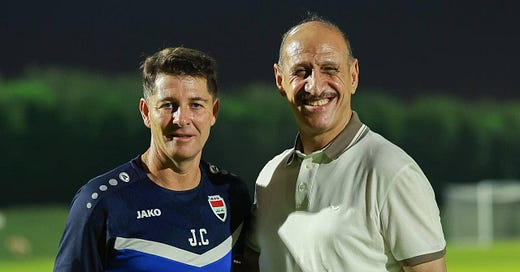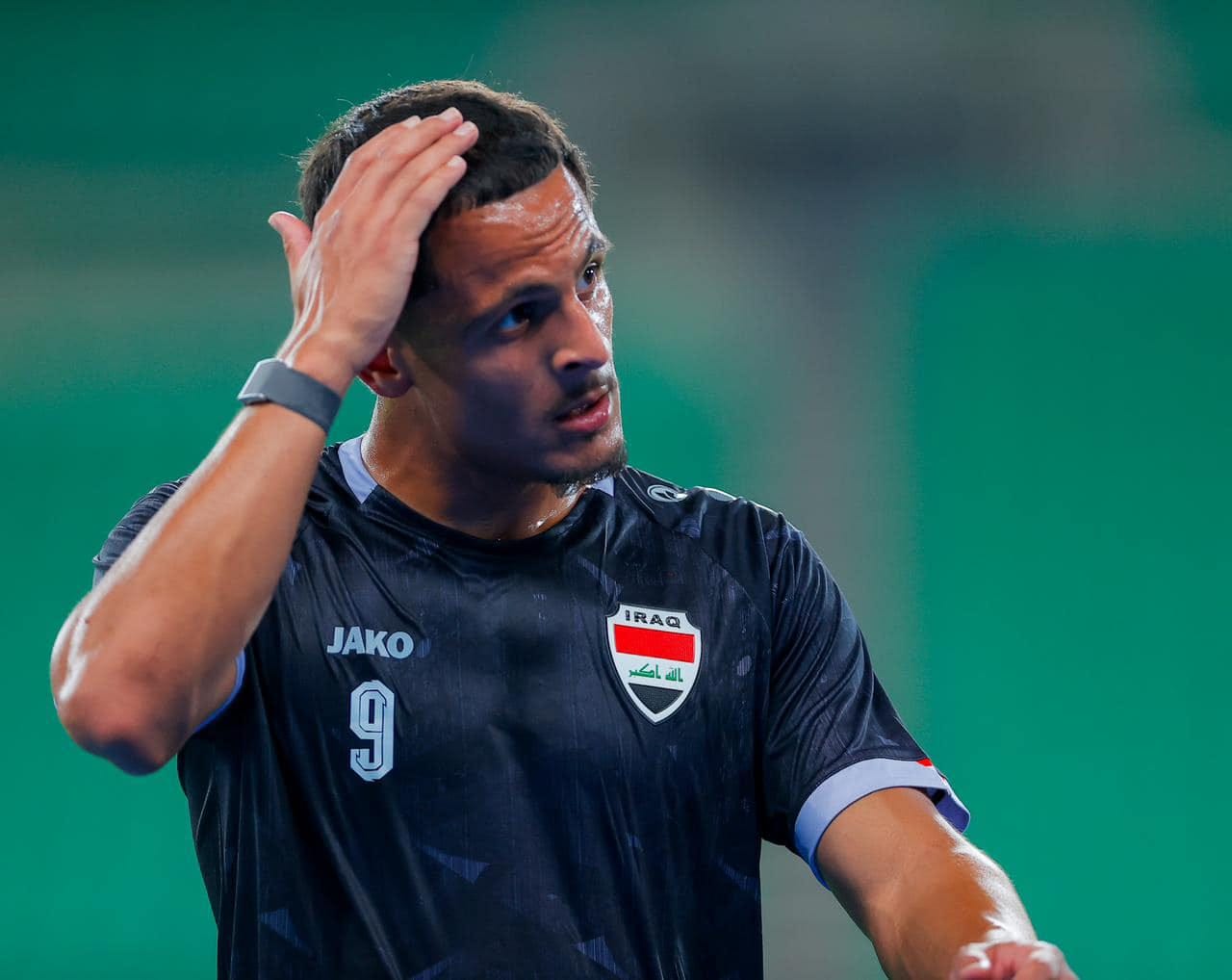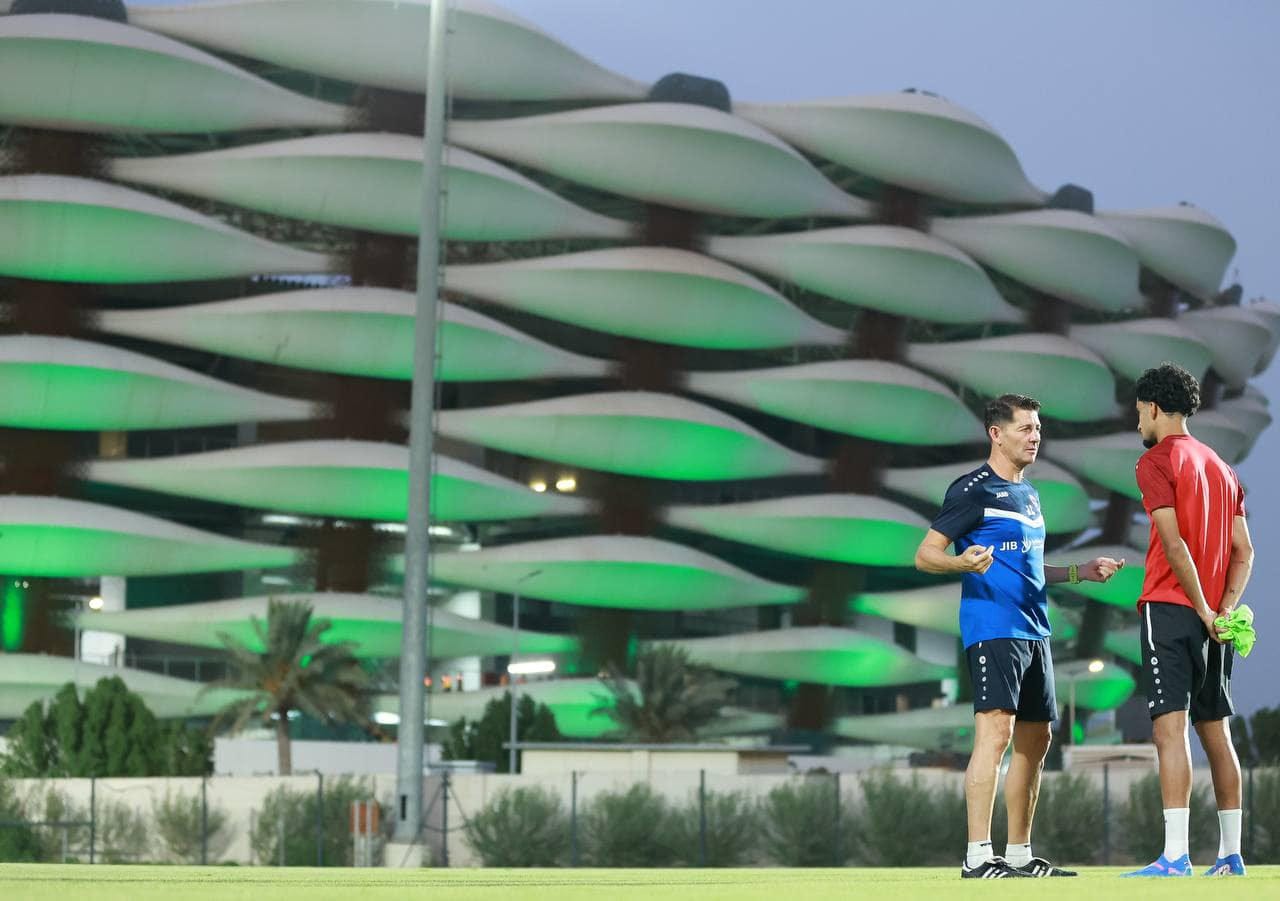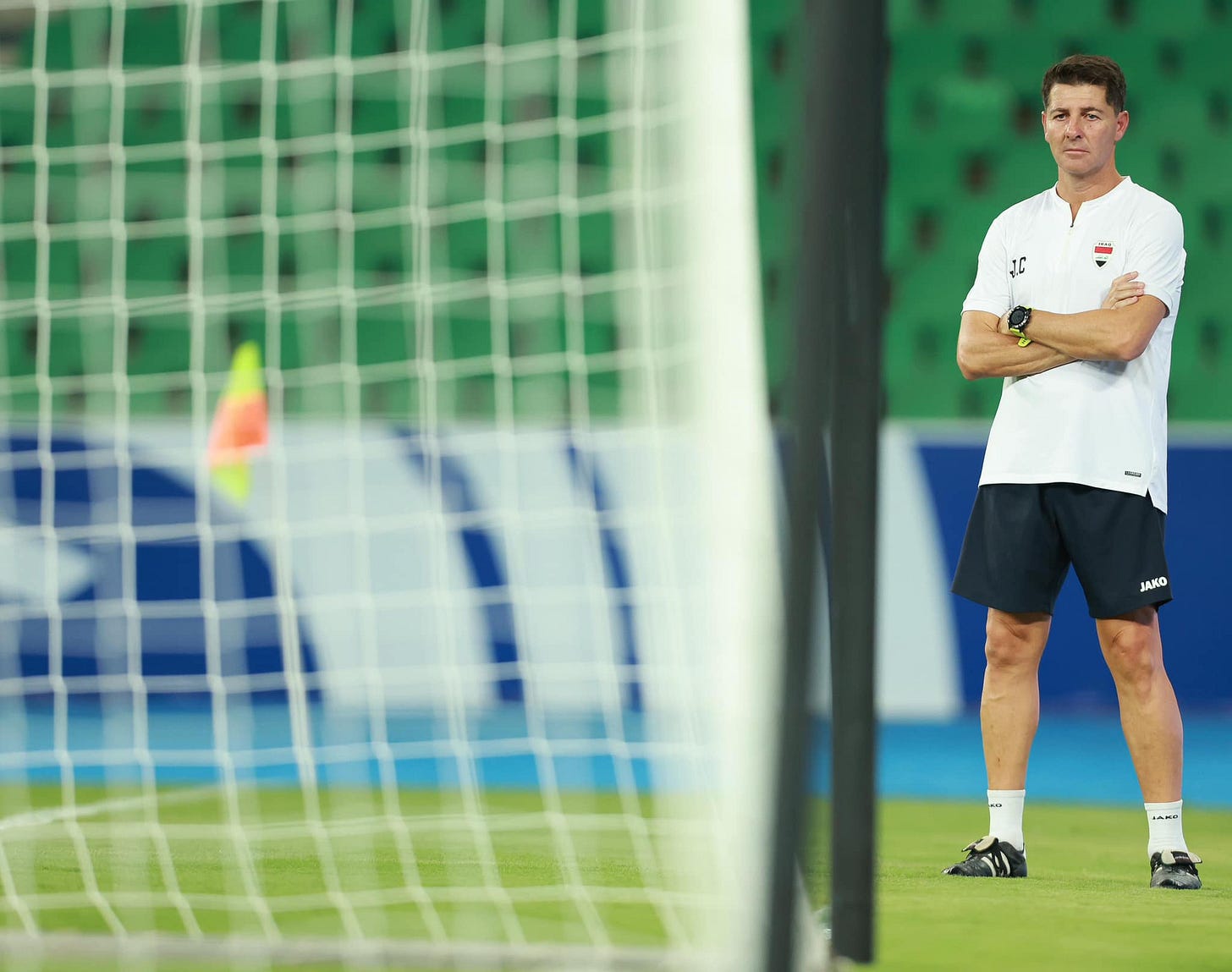The United Team: Casas, Adnan Dirjal, and re-writing a wrong
On Thursday evening, at the Basra International Stadium against Oman, Spaniard Jesús Casas and his Iraqi players will take their first serious steps to qualifying for its first World Cup in 40 years.
For the first time since the 1994 World Cup qualifiers, Iraq looks like they have a realistic chance of qualifying for a World Cup. There are plenty of reasons for optimism. The one that stands out is the decision by FIFA to hand the Asian continent eight qualifying spots for the expanded 48-team World Cup in Canada, United States and Mexico, and with a revamped qualifying format and Iraq’s improved world rankings, Casas’ men has had one of the most favourable draws in a long time.
For Iraq, it’s now or never, conditions are almost near perfect, or closest as it get for the Lions of Mesopotamia when considering the past failed qualifying campaigns. Stability has been key, and despite Casas recently losing the services of one of his backroom staff, with match analyst Pablo Grandes deciding to leave and take the job at one of Iraq's oldest clubs, Al-Minaa of Basra, his two trusted assistants, Salva Romero and Alejandro Varela, a cornerstone of Casas' staff, remain firmly by his side and an integral part of the team.
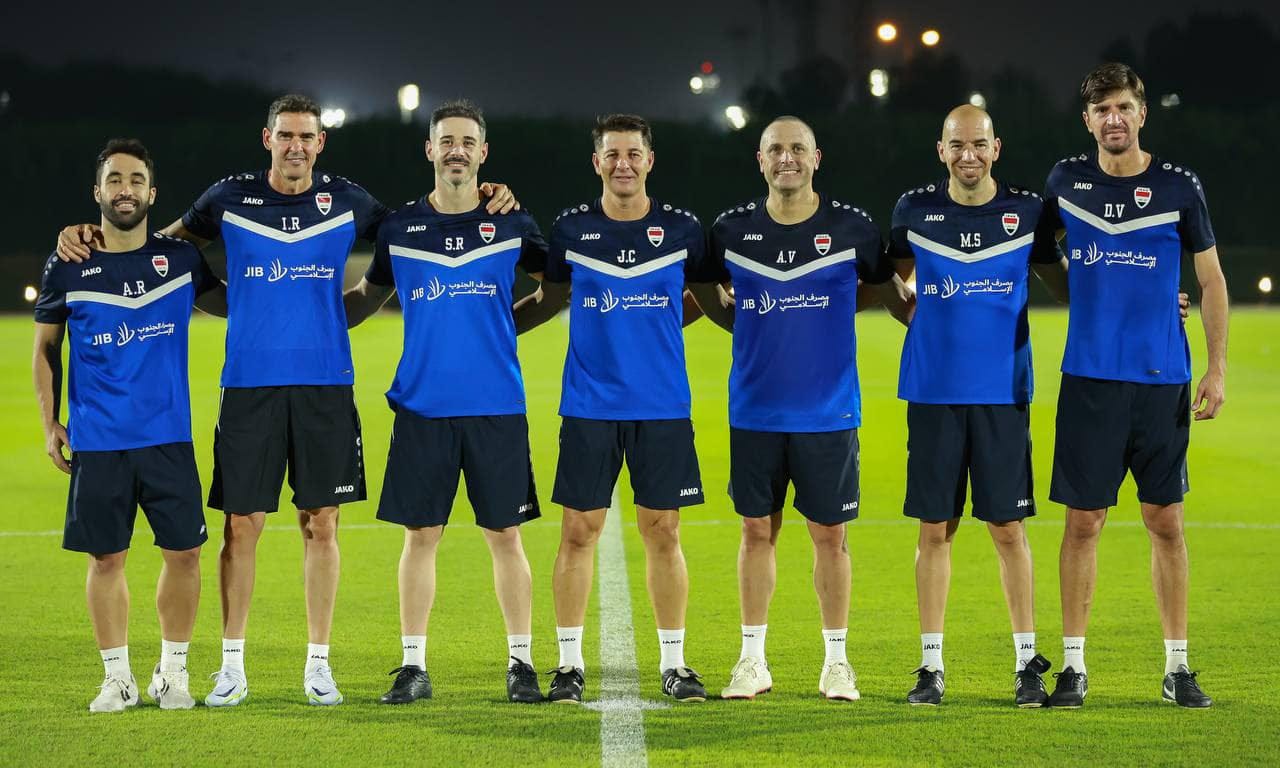
Speculation in the last few months over the Spaniard's future has also been resolved, and with Adnan Dirjal’s close relationship with key figures in the Iraqi government, thanks to his time as Minister of Youth, the Iraqi team has the backing, both financial and moral, from the higher echelons of the Iraqi Republic. The stage is set.
The team
There is a clear split between the local and expatriates factions, or there once was, but today, it is mainly a fissure magnified and manufactured through social media.
There are origins to the fracture, and the internal war, which started within the corridors of the Iraqi FA, has taken another level or tier. It is both simple and nuance, and involves different interests. The war between the two opposing sides has a long history.
In 2011, Iraq’s German coach Wolfgang Sidka had decided to make changes to the team, which was an aging side featuring players from Iraq’s victorious 2007 Asian Cup team. The former Werder Bremen trainer was the first Iraqi coach to accept the New Iraqi Players project as it was known then, the idea to select players of Iraqi origin, primarily based in Europe, to the national team, now called the Mughtarabeen or expatriates, but Sidka found strong opposition to it, not only from the players themselves believing they would lose their places in the squad, but also strong opposition from Iraqi FA officials, Why was this? Well, according to reports, some members of the Iraqi FA were taking a percentage of lucrative contracts Iraqi players were signing with clubs in the Gulf or other leagues, so the Iraqi team essentially became a kind of shop window for players to earn bigger contracts. The inclusion of expatriates would have ended such a practice, so for years, the Iraqi team featured only four or five mughtarabeen in the squad, an unacknowledged quota that was only lifted when Adnan Dirjal became FA president and appointed Jesús Casas.
For the first time, Iraq’s head coach was allowed the freedom to pick a squad of players based from around the world, and gave debuts to a record 13 expatriate players.
The current Iraqi squad has a cosmopolitan look and includes a Scouser, a Mancunian, three players who were born in Sweden (one of which is half Chilean), a midfielder born in Sydney, Australia, a winger who once played for Morocco’s youth team and another who appeared for Germany’s U19s.
But this internal FA war between the local and expat factions had expanded further, especially with people who had once benefited from the old Iraqi FA system and how it worked, now marginalised, and this is why the war has spilled over to social media and our TV screens, with some social media accounts reportedly having links to ex-FA members, and it doesn’t look like it is at an end point.
El Familia or the family is how Casas sees the Iraqi team and qualification for the World Cup can go some way to healing the fracture between the two factions, and finally putting to bed the mentality of division which has held back the national team and harmony between fans.
Adnan Dirjal and the World Cup finals
Qualification for the 1986 World Cup was a culmination of over a decade of hard work by the country's sports authorities to cultivate a new generation, the 2007 Asian Cup victory was the highest point of success under the tenure of the old-Iraqi Football Association, coming at one of the most difficult periods in the country's history after the 2003 War.
And the 2026 World Cup could be the start of something significant for Iraq, rather than the culmination or a highlight.
Iraq's FA president Adnan Dirjal is the man behind Iraq's resurgence, a person who knows a lot about adversity, the person who finally brought down the old post-2003 Iraqi FA dynasty that was formed by Hussein Saeed, and followed by Najih Humoud, and Abdul-Khaliq Masoud, and would have continued under Ali Jabar, who once declared he could get elected even if he was sat at home.
The 2026 World Cup represents more than just qualifying for a second World Cup finals, but some redemption for Iraqi football after so many failures, and also a year zero kind of restart to the Iraqi game.
1990 was the year that changed everything for Iraq, on August 8, 1990, Iraqi forces invaded neighbouring Kuwait and unleashed the onset of decades of war, economic sanctions and political instability, which Iraqis, to this day, still suffer the repercussions of.
Iraqi football was then at its peak, the Iraqi national team was considered one of the strongest in Asia as was its domestic league, and a year prior, Iraq's new generation of Emad Hashim, Radhi Shanaishel and Laith Hussein had beaten Argentina, Spain and Norway to top their group at the 1989 FIFA World Youth Cup in Saudi Arabia, before being knocked out in the quarterfinals by the United States.
Iraqi football was on the cusp of being at the top of the Asian game, maybe even dominating the continent, and seeing the Lions of Mesopotamia qualify for consecutive World Cups like Saudi Arabia, Japan and Korea eventually did, but then the invasion happened.
For Iraq's FA president, Adnan Dirjal, qualifying for the World Cup is something very personal. In 1986, he was part of a generation which qualified for Iraq's first World Cup in Mexico, but missed out on playing in the finals after picking up an injury on the eve of World Cup. He was then captain when Iraq failed to qualify for the following tournament in Italy, losing out because of a calamitous goalkeeping error.
Then, two years later, Iraq's FA president Uday Saddam Hussein assigned Adnan Dirjal the coach of Iraq for the 1994 World Cup qualifiers which was to be held in the home of Uncle Sam, the United States of America.
On the eve of the final stage of the qualifying tournament in Qatar, the Iraqi coach told reporters “If we qualify, we know it will be the biggest slap the monster America will get.”
With all the political implications surrounding Saddam's Iraq qualifying for a World Cup in America, even the administration of the then US President Bill Clinton was reportedly monitoring the situation of the final qualifying rounds in Doha. The US State Department had also refused to confirm whether Iraq, Iran or North Korea would be granted visas if any of the three teams qualified.
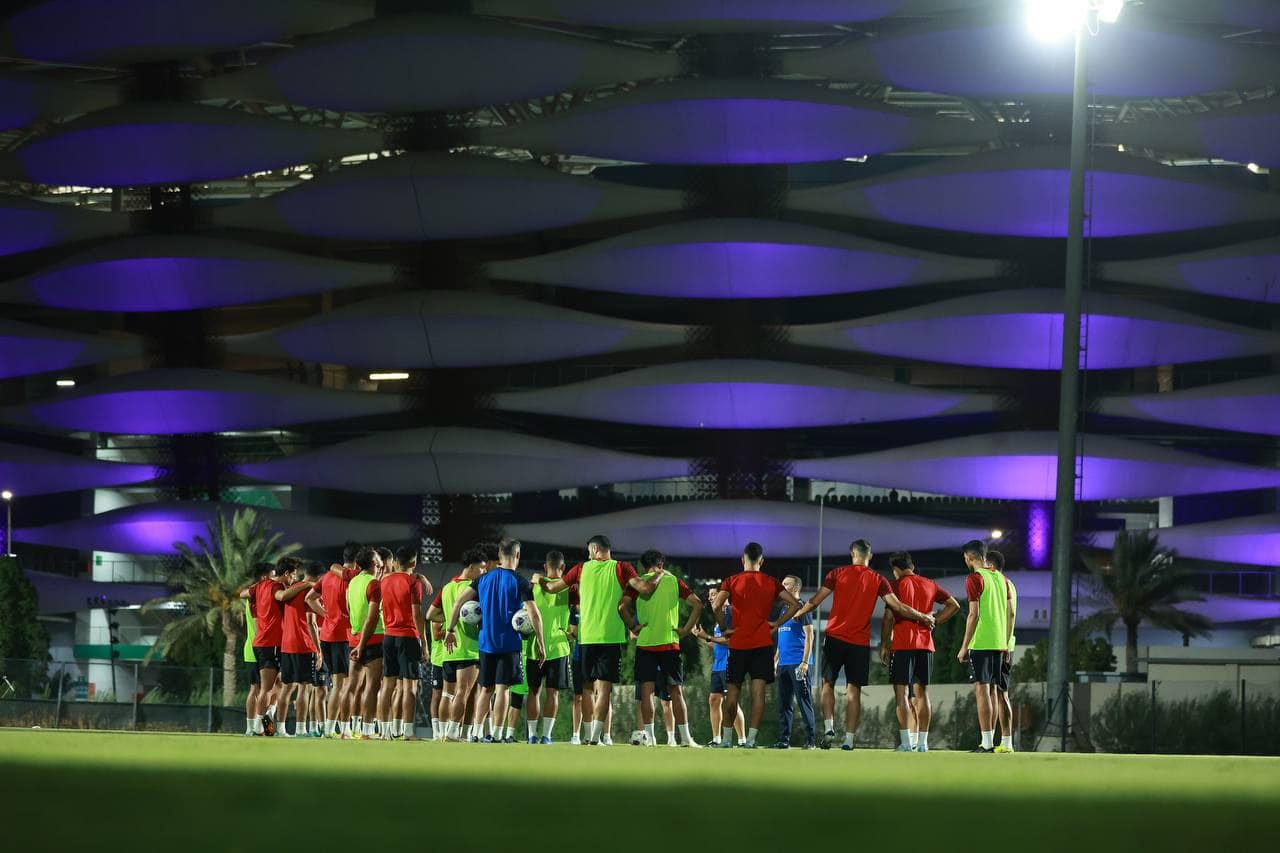
FIFA had also instructed the 13 European referees appointed for the final stage in Doha to apply the letter of the law, and it seemed to many Iraqis that like North Korea and Iran on America's list of unwelcome nations, its team never got the benefit of doubt in any on-field decision. Incidentally, in the matches involving the three teams, each side inflicted defeats on each other, cancelling each other out in regard to points on the board, with controversial refereeing calls in each of the matches.
In Iraq's opening game against North Korea, the Lions of Mesopotamia were leading 2-0 early in the second half, when the Romanian referee harshly sent off Iraq's left back for a second bookable offence.
The red card led to confusion on the Iraqi bench over which player to take off to bring on a replacement left back, and after lengthy deliberations with his two assistants, Adnan Dirjal took off his only holding midfielder, and, subsequently, the floodgates opened, and in the space of just 12 minutes, Iraq found themselves 3-2 down and eventually lost the game.
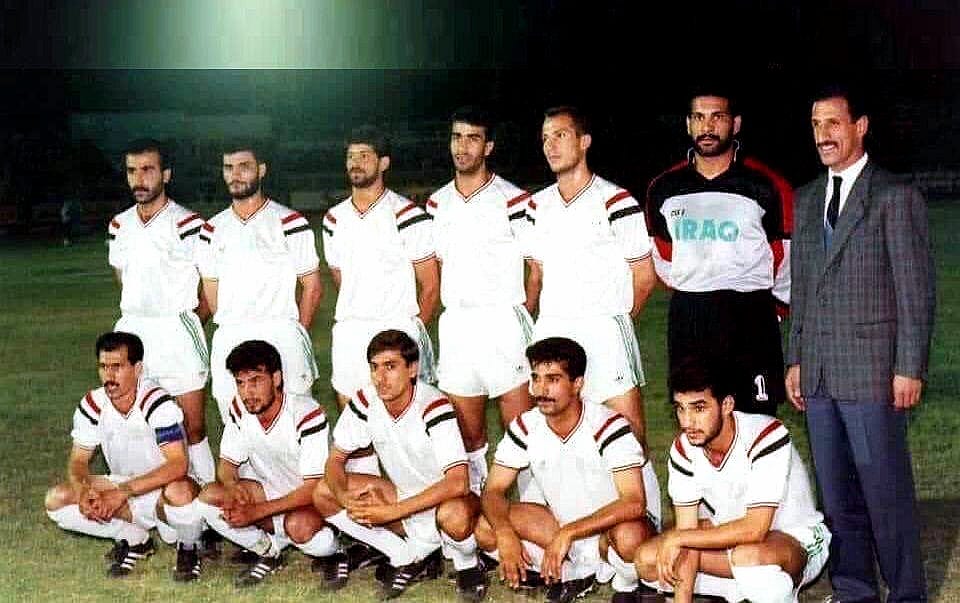
Adnan Dirjal was sacked 24 hours later, and despite Iraq, under the late Ammo Baba, remaining undefeated in the remaining qualifiers, the sole loss to North Korea cost the Lions of Mesopotamia qualification for the World Cup in the United States.
Adnan Dirjal's team was regarded as one of the best Iraq had ever produced, but the 3-2 defeat to North Korea and how it all unfolded has never been forgotten and is still talked about to this day.
For Adnan Dirjal, the defeat is a constant reminder of his failure and that of Iraq, but qualifying for the 2026 World Cup in the United States could be his way of re-writing a wrong and kick starting Iraqi football that has remained stuck in quagmire since the catastrophic events of 1990.
